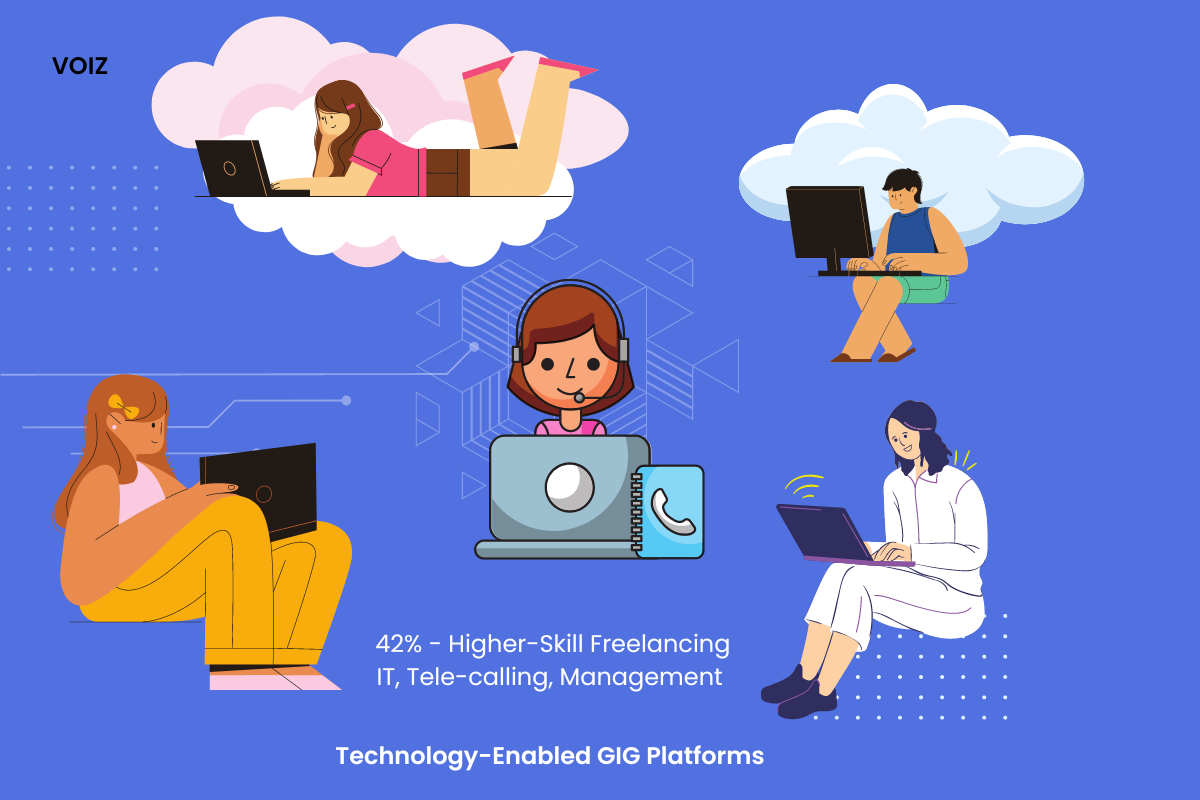Five key benefits brought in by VOIZ with its Technology-Enabled Gig Platforms:
- Improved efficiency across supply-demand of remote Gig workers
- Increased number of earning pathways and enhanced livelihood potential
- Catalysed economic recovery via remote jobs that expand Gig work participation (especially for women and students)
- Formalisation of On-Demand Gig work versus current informal set-up
- Creation of around 3 million net new jobs in India to cater to the current unmet demand for Corporates and Households alike
First, Real-time technology-enabled platform offering on-demand Gig workforce enhances the efficiency of large-scale discovery and fulfilment for workers. This addresses two key concerns that Indian employers typically have, Viz:
- Despite the widespread availability of workers in India, employers face a gap when attempting to locate a qualified workforce for simple yet critical tasks like Telecalling, Executive Assistance, etc.
VOIZ’s platform enables employers to hire workers in real-time and at scale – thereby catering to the constrained demand in corporations as well as the latent demand in households which typically goes unmet due to lack of transparency and visibility.
- Our Gig workforce broadens the pool of potential employers (organic or otherwise) by calibrating demand and lowering the entry barrier for hiring workers or services; employers no longer need to Fixed Term Employees, adding to the expensive benefit schemes. They can hire Gig agents from VOIZ on a short-term basis, sans any commitment.
Better visibility and discovery across the workforce supply-demand journey, as provided by VOIZ’s technology platforms, can thus lead to greater economic efficiency and increased likelihood of adoption when platforms operate at scale.
Second, VOIZ’s Technology-based gig platforms help align the economic incentives of employers with those of gig workers. Platforms play the simultaneous role of reducing employers’ fixed workers’ budgets while increasing livelihood potential for workers.
VOIZ offers agents (from its platform) to be hired by employers to accomplish tasks and be paid only on a task or time basis; freeing up the gig workers to take up additional jobs within VOIZ or otherwise, providing on-demand jobs/projects for additional income.
The VOIZ platform brings in price transparency, the capability to monitor work quality, and tweak deliverables all in real time. Agents are brought into the platform and made job-ready with qualification tests at onboarding, along with training on soft skills. Experienced agents also come with a rating from previous customers, Which is a great validation of their capabilities at specific tasks.
Third, the gig economy could catalyse economic recoveries and expand labour participation (especially for women and students).
Amidst the Covid-19 pandemic, the unpredictability associated with economic recovery and the existing or future need for full-time workers has made numerous companies, especially MSMEs, sceptical to resume hiring. Meanwhile, workers have also become acutely aware of the need for more stability and income assurance in traditional part-time and on-demand work. Gig platforms have played a critical role in enabling employers to hire workers on-demand while simultaneously providing employees with visibility and assurance of income without the need for ‘full-time’ work.
By definition, VOIZ’s gig work has flexible work hours and inducts into the workforce those segments of the population who are unavailable for traditional 9-5 jobs.
Fourth, the gig economy accrues several collateral benefits associated with “formalising” Gig jobs markets.
In the Indian context, traditional forms of gig work exist in every economic sector, typically driven through personal and offline networks. These “informal contracts” and “know workforce” are connected to each other and flourish under the broad umbrella of the economy. With the advent of gig platforms like Uber, Ola, Swiggy and Urban Company, among others, a certain level of formalisation has been set for workers on these platforms with visibility of work patterns and potential earnings.
Finally, technology-based gig platforms can improve productivity in various sectors of the Indian economy. It is expected that productivity improvements over time will also reduce the total cost of consumption of the products and services that gig work contributes to. This will lead to increased consumption with a virtuous cycle of additional job creation and economic expansion.
New business ventures, such as the development of ancillary services supporting the gig economy, will also contribute to economic expansion. The potential services that could emerge to support the gig economy include training and skilling providers, skill validation and credential providers, financial services and credit facility providers, and adjacent partnerships.
Conclusion:
Gig work, far from being a stop-gap or temporary work option, is a significant and growing contributor to economic growth and livelihood for the new generation across the world. By aligning economic incentives of employers and workers with embedded mechanisms to improve productivity, it expands gig workforce participation & developing ancillary economic activities.
VOIZ’s Tech-Enabled Gig work is here for good – representing an exciting work arrangement that can bolster demand and improve livelihood opportunities, especially for secondary-income earners in the Indian economy.

